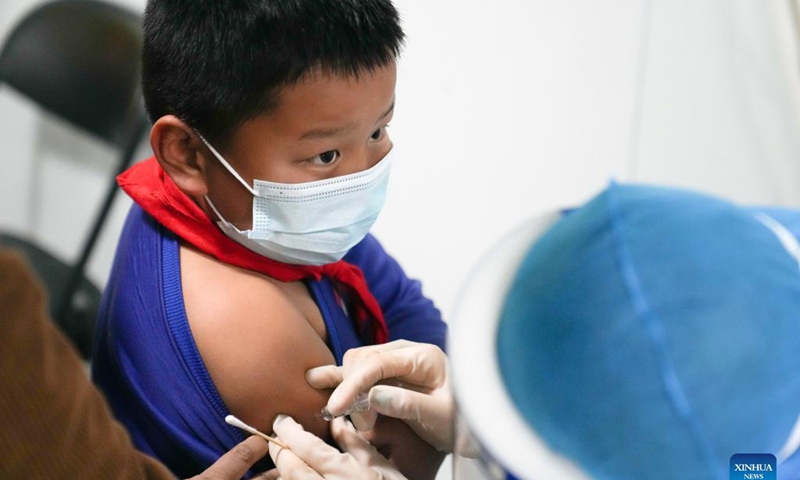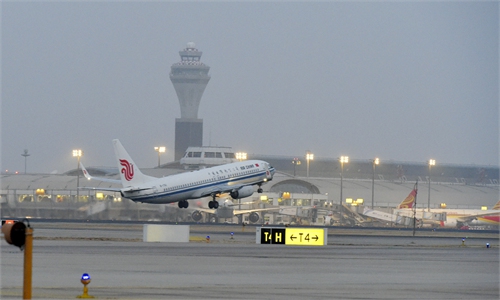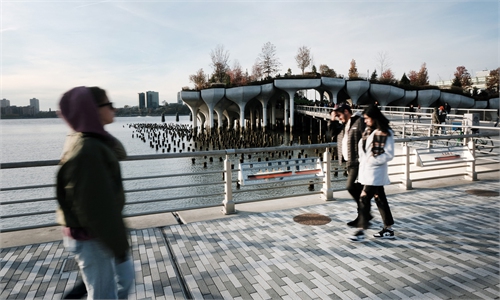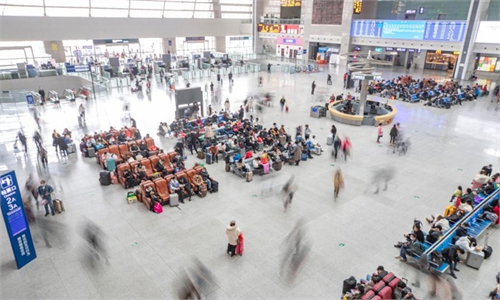85% of Chinese fully vaccinated ahead of festive travel rush
Possibility of major epidemic resurgence low but risks remain: experts

A medical worker administers a dose of COVID-19 vaccine to a child at a vaccination site in Panggezhuang Town of Daxing District in Beijing, capital of China, Nov. 4, 2021.Photo: Xinhua
China is nearing herd immunity 85.64 percent of the Chinese population fully vaccinated ahead of the coming New Year and Spring Festival travel rush, which is expected to see passenger trips surpass the 1.48 billion taken in 2020, the National Health Commission (NHC) announced on Wednesday.
Given such a high vaccination rate, together with China's mature dynamic zero-case policy, experts said the possibility of a major epidemic resurgence during the two holidays is low, but they warned people not to let down their guard as the country continues to face threats posed by the epidemic overseas and the highly contagious Omicron strain.
A total of 1.274 billion people have completed a full course of vaccination against COVID-19, which means 85.64 percent of the population is fully vaccinated, He Qinghua, an official of the NHC, said at a press conference on Wednesday. He said vaccines are a great weapon to prevent COVID-19, calling for more people to receive vaccines, especially those above 60 years old.
Wang Guangfa, a respiratory expert at Peking University First Hospital, told the Global Times on Wednesday that the 85.64-percent figure means China is approaching herd immunity, which will contribute to slowing viral transmission and reducing the chance of people contracting the virus, becoming severely ill or dying.
Wang said the high percentage of vaccination doesn't mean the country should let its guard down, as purely relying on vaccination has demonstrably failed to control the epidemic, citing Israel and the UK as examples.
Experts estimate that herd immunity would require around 80-90 percent of the population to have COVID-19 immunity, either through prior infection or vaccination. Chinese top expert Zhong Nanshan previously predicted that the percentage to build herd immunity against COVID-19 would be about 83 percent, but some other experts warned that the serious Omicron variant probably had pushed the standard higher.
To ensure a safe travel rush in the holidays, experts stressed the necessity of sticking to the dynamic zero-case policy while accelerating vaccinations and booster shots.
The 2022 Spring Festival travel rush will last 40 days from January 17 to February 25. Preliminary forecasts show passenger trips during the entire 2022 Spring Festival travel rush will increase significantly from 870 million in 2021, and may even surpass the 1.48 billion in 2020, Ren Zhuoli, an official from the Ministry of Transport, said on Wednesday.
Ren said the ministry will build a special team jointly with other 14 departments to handle epidemic issues for the travel rush. The number of trips during the New Year holiday is expected to be about 80 million, a slight decrease compared to that of last year.
The NHC underlined at the press conference that China will unswervingly adhere to the dynamic zero-case policy. Once an outbreak occurs, the country will suppress the spread of the virus at the fastest speed and at the lowest cost.
The chance of having a large-scale flare-up during the holidays is low, Zhang Yuexin, a medical expert specializing in epidemic prevention and control, told the Global Times on Wednesday. Prior to the two festive holidays, the country mapped out concrete measures to detect and prevent COVID-19 resurgence, and to prevent and cope with emerging outbreaks.
In two years, the country has frequently adjusted and optimized the dynamic zero-case policy, which has proved to be correct, Zhang said.
The epidemic resurgence in Xi'an, Northwest China's Shaanxi Province still poses a higher chance of community transmission, but it should not have a great impact on the travel rush during the upcoming New Year and Spring Festival.
A dynamic zero-case policy does not mean zero infections, as nobody can guarantee that not a single local case will occur when the country continues to get imported cases, Zhang noted.
Since the Wuhan epidemic in 2020, almost all of the domestically transmitted flare-ups in the country were found to be related to overseas cases. The situation in China is basically safe and the top priority is to prevent inbound cases, Wang told the Global Times.
To ensure that Chinese people have a peaceful festival, the State Council, the cabinet, will dispatch 15 teams to supervise local epidemic control work during the New Year and Spring Festival holidays.
The anti-epidemic work in ports and centralized quarantined places will be their main focuses.




